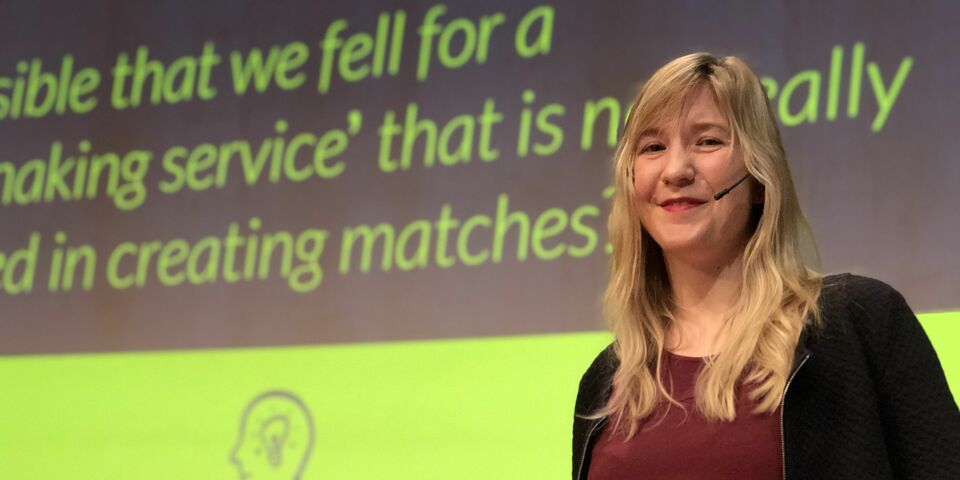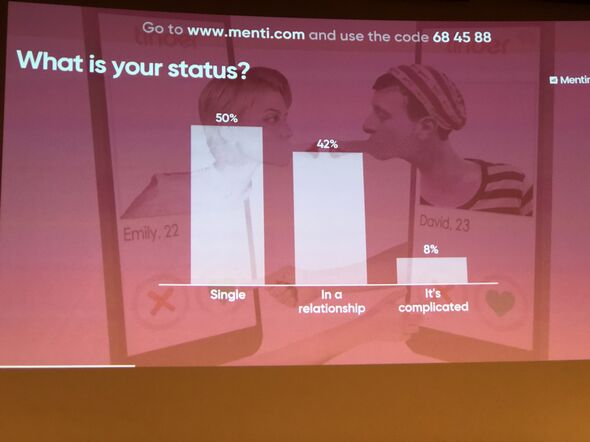Does the dating-app Tinder actually strive to provide people with a relationship? Elisabeth Timmermans doubts it, suggesting instead that Tinder’s algorithm aims to direct people towards its paid service as soon as possible. "Tinder wants to make sure that users are not unsatisfied, but not satisfied either. They have to continue using the app and swipe, but simultaneously long for that little bit extra, so that they will start paying," she explains. Timmermans studies the influence of social media and apps on relationships. Amongst others, she has researched the dating-app Tinder, about which she wrote the book Liefde in tijden van Tinder (Love in times of Tinder). She starts her talk on a Wednesday afternoon in the fully packed Blue Room (around 275 people) by holding a small poll amongst those attending. First of all, she inquires about everyone’s relationship status.
The second question is whether those attending the lecture use Tinder. Only 10 percent answer with a wholehearted ‘yes,’ whereas 15 percent indicate they use the app occasionally. On the question of whether any members of the audience have ever found a partner via a dating-app, 11 percent of answers are positive. Whilst 27 percent believe that online dating works, 58 percent of the audience say the answer is a little more complicated than a simple ‘yes’ or ‘no.’
For contex, first a few numbers: Tinder was launched in 2012. Five years later, the app had around three million users. When Timmermans asks who is paying for Netflix, almost all the hands in the Blue Room are raised, but when asked who is paying for Tinder, the hand-count remains low. Yet paying for the use of Tinder is precisely what the company is aiming for.
Timmermans explains how Tinder earns its money: via advertisements, for example in swipe-games, but also by selling personal data. "Of course, they say they don’t do such things, but via websites such as Cheaterbuster you can find out—by paying—whether your partner is on Tinder." In addition, there are the premium versions, which allow you, for example, to view more profiles for an extra fee.
Dopamine Shot
"Every time you get a like on Tinder, you receive a dopamine shot," Timmermans explains. Everyone wants to experience that nice feeling again, and again. Precisely this is what the dating-app’s algorithm cleverly plays into. Aided by a deck of playing cards, Timmermans illustrates how men and women swipe on Tinder: "Men choose very quickly, and tend to swipe almost everything to the right (= interested). Over a period of twelve hours, you can do this one hundred times, but after that, you have to pay in order to be allowed to continue swiping."
Conversely, women are much more considerate, deliberate and check, and then start swiping. Often, they want to find someone back they had initially swiped away. Here too, the paid option comes into play, in the form of Tinder Plus.
Timmermans conducted her research in 2017 amongst 3,262 heterosexual users in the Netherlands. She asked the group for the reason they use Tinder. Much to her surprise, rather than just one or two, thirteen reasons emerged why users might open the app.
Dating Is Gaming
You would expect that ‘a relationship’ and ‘sex’ would be in the top three, but that could not be further from the truth. ‘Passing the time and entertainment’ takes first place. "Because of the swiping, dating has become gaming," Timmermans asserts. "Tinder-drinking games have even started to emerge: For example, if you have spotted five profile pictures of women with a horse, or—the male counterpart—five men with a fish, you have to take a shot."
The second most important reason for using Tinder is ‘curiosity,’ followed by ‘socialising’ and ‘love.’ It also provides people with an ego boost, acts as a distraction, improves social skills and then, only in eleventh place out of thirteen, was used to find ‘casual sex.’ Reasons enough to use the app, but when asked whether she would recommend people to seek a relationship via Tinder, Timmermans answers with a very decisive ‘No!’



Discussion